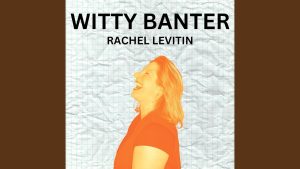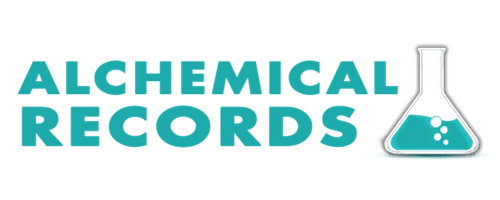
Witty Banter is One for the Books
Recent Articles March 21st. A day that I will always think of amazing album releases. DC-based musician, producer, and singer-songwriter, Rachel Levitin, released Witty Banter

by Molly Guillermo
At various points during their EP Drep 01, it becomes difficult to tell how the DC-based duo Data Recovery Project gets their robotic rhythms and haunting, alien-esque sounds. The audio engineering is masterfully done. Composer Christopher Kush affirms he uses Maschine and Traktor to make the the sounds we’re hearing, and they’re not as odd and space-like as they sound. The textures on these five tracks are surreal and original as well as familiar, recalling the voices of past and present musicians. At times, the lead singer’s voice is reminiscent of Joy Division’s Ian Curtis – low and somber, almost monotone. And at other times, on more cheerful tracks, his voice is similar to that of indie pop group Bleachers’ Jack Antonoff. Regardless, Data Recovery Project has brought something new to the district’s experimental music scene – an irreverence towards the status quo and a fondness for synthesizers.
The local DMV artists recently performed at The Fiddler’s Elbow in London and are looking forward to a tour in Florida. I reached out to them to see how it’s going and how playing abroad has impacted their enthusiasm for their upcoming performances.
What was the venue like, and how was the audience?
CHRISTOPHER KUSH: We were thrilled to play the Fiddler’s Elbow – well-known Camden Town institution. The cabdriver knew it. The guys we shared a table with at breakfast knew it. Once there, we saw gig posters and records from both Adam Ant and Frankie Goes to Hollywood on the wall – so we knew we had come home.
How was your music received in London compared to other cities like New York and DC? Did the energy of the performance feel similar to those of previous shows?
CK: Music fans in England seem well-versed in electronic music and seem interested in seeing new bands that explore the genre. Maybe the best connections were after we got off the stage – the sharing with each other of other bands for us all to check out. It was that feeling you go to shows for – to find out that there are others like you.

Which songs did you play live for the first time? Are you happy to have played them first in London, and do you think they will be received differently during your upcoming shows in Florida?
CK: We played a very atmospheric and dark song, “Catastrophe,” for the first time. This is the first song we wrote on our invented instrument, the drum-machine-tar, so it looks, sounds, and feels like the very latest incarnation of Data Recovery Project.
You’ve described yourselves as an electronic duo with experimental visual performances and graphics. Which of your songs would you say had the most unique visuals, and what was that like to perform?
CK: We have video of the gig at Fiddler’s Elbow that we are editing and posting. It is hard to describe the instrument that we invented for DRP if you have not seen it live. People should check us out on Instagram and YouTube to get a taste. There are a lot of blinking lights.
As a duo, do you consider DRP its own entity? Or a name for yourselves?
CK: Data Recovery Project is currently somewhere between an idea . . . an indulgence . . .and becoming an actual thing. We are sharing a vision and sound that is a blast for us to perform. The fact that people are not throwing bottles at us is a nice surprise. And so the excitement grows.
When you first started to record your EP Single-Step Into the Sun, was it a process of trial-and-error, or were you already comfortable making your own record? Did you collaborate with any other artists?
CK: We sometimes feel we are alone on a musical island in DC. We’ve played Key West three times in the last year, New York City three times in the last year. Now London. We are always reaching out to local musicians we find online who we think might be into similar things – but we have not found many gigging musicians working in our genre locally. We are not musical gods or heroes – but we are making our own scene, one gig at a time and virtually willing into existence. We are pretty sure this is the only way it happens nowadays.
When you’re listening to music for pleasure, do you find yourselves listening to music as musicians and producers, or are you able to step outside of that?
CK: Oh, now we are producers. Both Daniel and I are constantly mining for retro sounds – and records that sounded so huge and complex to me back in the day are kinda less intimidating now because we know what delay is, and what layering is, and what compression is, and the EQ spectrum. We are like little electrical engineers now – little musical electrical engineers.
What was most meaningful to you about performing in London, and is doing a longer Euro tour a goal of yours? Are there any other cities you’ve got your eye on at the moment?
CK: I begged them to invite us back to London from the stage. You would have to ask Daniel how embarrassing or pathetic or desperate it looked. I didn’t care – we were all having a blast – and we continued the party right into the green room – hidden beneath the staircase – which may also have been a storage area. To us – it was the height of decadence – despite the dustpans.

Based in DC by way of San Francisco, Molly originally hails from southern California and has a background in English. She aims to explore music’s inextricable tie to pop culture and its evolving relationship with politics.

Recent Articles March 21st. A day that I will always think of amazing album releases. DC-based musician, producer, and singer-songwriter, Rachel Levitin, released Witty Banter

Alchemical Records is a Washington, D.C. based music publication. We cover the Washington, D.C., Baltimore and Richmond, VA metro area music scenes, including band interviews, articles about your favorite musicians, new music and concert dates.